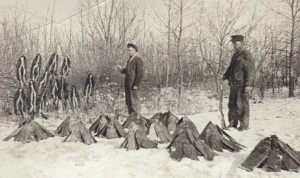trapping

 In 1910 – 1911, my Grandpa Spencer and my grandma’s brother, my Uncle Albert Schumacher, spent the winter months trapping and working in the logging camps in northern Minnesota. This was before my grandparents were married. The men took several pictures before embarking on the journey from the Schumacher farm in Elliot, North Dakota in September 1910 for their “winter in the woods”. My grandpa took his 1895 Winchester 30-03, the gun that was his pride and joy, and Uncle Albert had a 1899 Savage and they headed off on their adventure. It would be a winter to remember. It was freezing cold, often getting down to 30° below zero.
In 1910 – 1911, my Grandpa Spencer and my grandma’s brother, my Uncle Albert Schumacher, spent the winter months trapping and working in the logging camps in northern Minnesota. This was before my grandparents were married. The men took several pictures before embarking on the journey from the Schumacher farm in Elliot, North Dakota in September 1910 for their “winter in the woods”. My grandpa took his 1895 Winchester 30-03, the gun that was his pride and joy, and Uncle Albert had a 1899 Savage and they headed off on their adventure. It would be a winter to remember. It was freezing cold, often getting down to 30° below zero.
They built what they called a flat boat to carry their supplies, two rifles, two handguns, plenty of ammunition, and plenty of dried and canned food. The boat could also be loaded onto a wagon when they needed to travel across country, although, I’m not sure where they got the wagon after traveling by water. Still since I have seen the picture with the boat on the wagon, I know that they got that part covered as well. In the end, the cold winter sort of won out. They trapped during October and November and then worked in the logging camps until spring.
While the cold winter, and the freezing conditions did change their plans for the winter, you could still say that they had a successful winter of trapping anyway. Now, I don’t know how I would feel about trapping skunk, because at some point you have to go and deal with that carcass, and to me that would be horrible. We have all driven by a spot where a skunk was killed, and…whew, what a smell!! Nevertheless, my grandpa and my uncle took that in stride and came away with a good amount of skunk and muskrat pelts for their efforts. My Uncle Bill, who I must credit for the information in this story, figured that in all, 
 they probably made about $100.00 for that cold winter’s trapping venture, plus the money earned while working in the logging camps. It may not sound like much money for all that work and the freezing conditions, but in 1910 and 1911, it was a pretty decent wage.
they probably made about $100.00 for that cold winter’s trapping venture, plus the money earned while working in the logging camps. It may not sound like much money for all that work and the freezing conditions, but in 1910 and 1911, it was a pretty decent wage.

